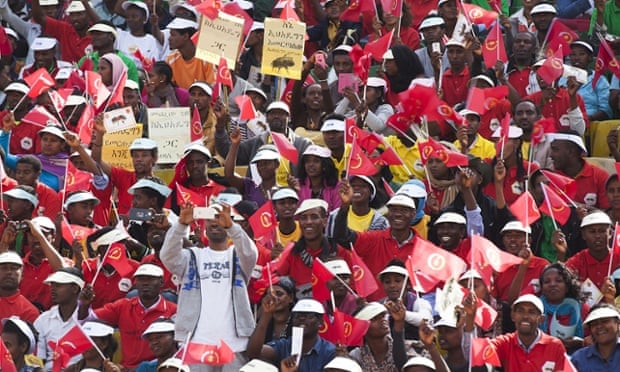There was no immediate reaction from opposition parties, but critics dismissed the results. “This result was completely expected, there is no multiparty system in Ethiopia. It’s just fake,” said Taye Negussie, a sociology professor at Addis Ababa University.

Prime minister Hailemariam Desalegn’s Ethiopian People’s Revolutionary Democratic Front (EPRDF) scored a landslide victory, stripping the opposition of the one seat it had held in the outgoing chamber, said Merga Bekana, chairman of the electoral board on Monday.
Preliminary results for the one constituency that still had to return final results – the southwestern Bonga district where elections were delayed – showed the EPRDF also winning that seat.
“The performance of the ruling party is good but the competition was strong,” Merga told reporters at the release of the final results.
“The general elections were characterised by high voter turnout and orderly conduct of the elections proceedings. The elections were culminated in a free, fair, peaceful, credible and democratic manner.”
Along with its allies, the EPRDF, which has governed Africa’s second most populous nation for more than two decades, also won a near clean sweep in regional state councils, winning all but 21 of the 1,987 seats.
Government spokesman Shimeles Kemal said the party’s success was the result of Ethiopia’s economic advances. “Voters have credited the ruling party for the economic progress it introduced in the country,” he said, speaking before the final results were announced.
“They want the continuation of this policy. In view of the weak, fragmented opposition and the lack of viable alternative, it was very likely that the ruling party would win in a landslide.”
Preliminary results for the one constituency that still had to return final results – the southwestern Bonga district where elections were delayed – showed the EPRDF also winning that seat.
“The performance of the ruling party is good but the competition was strong,” Merga told reporters at the release of the final results.
“The general elections were characterised by high voter turnout and orderly conduct of the elections proceedings. The elections were culminated in a free, fair, peaceful, credible and democratic manner.”
Along with its allies, the EPRDF, which has governed Africa’s second most populous nation for more than two decades, also won a near clean sweep in regional state councils, winning all but 21 of the 1,987 seats.
Government spokesman Shimeles Kemal said the party’s success was the result of Ethiopia’s economic advances. “Voters have credited the ruling party for the economic progress it introduced in the country,” he said, speaking before the final results were announced.
“They want the continuation of this policy. In view of the weak, fragmented opposition and the lack of viable alternative, it was very likely that the ruling party would win in a landslide.”
There was no immediate reaction from opposition parties, but critics dismissed the results. “This result was completely expected, there is no multiparty system in Ethiopia. It’s just fake,” said Taye Negussie, a sociology professor at Addis Ababa University.
Ahead of the results, the Addis Standard, a rare independent voice in the Ethiopian press, commented on the “tragic demise of the multiparty system”. The EPRDF took back the only seat that was held by the opposition, securing all 23 seats in the capital Addis Ababa.
Ethiopia, whose 1984 famine triggered a major global fundraising effort, has experienced near double-digit economic growth and huge infrastructure investment, making the country one of Africa’s top-performing economies and a magnet for foreign investment.
It also remains a favourite of key international donors, despite concerns over human rights, as a bastion of stability in an otherwise troubled region.
Ethiopia’s former Marxist rebel-turned-leader, Meles Zenawi, who died in 2012, was succeeded by prime minister Hailemariam, who has said he is committed to opening up the country’s political system to allow more space for opposition parties.
But rights groups routinely accuse Ethiopia of clamping down on opposition supporters and journalists, and of using anti-terrorism laws to silence dissent and jail critics.
The African Union deployed 59 observers for the polls, but EU and Carter Center observers, who were present for the 2010 vote, were not invited.
African Union observers said the polls passed off without incident, but the opposition alleged the government had used authoritarian tactics to guarantee victory. Activists have said the polls were not free or fair due to a lack of freedom of speech.
The United States, which enjoys close security cooperation with Ethiopia, said it remained “deeply concerned by continued restrictions on civil society, media, opposition parties, and independent voices and views”. In late July, US president, Barack Obama, will become the first sitting American leader to visit Ethiopia.
The EU has also said that true democracy had yet to take root in Ethiopia.

No comments:
Post a Comment